Memoirs & Diaries - At Messines Ridge in 1917
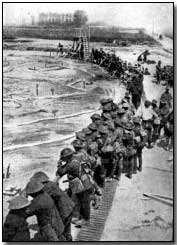 Working Party.
Early in the spring of 1917 the 11th Northumberland Fusiliers, to which I
belonged, were taking their share in the final preparations for the assault
on the Messines Ridge.
Working Party.
Early in the spring of 1917 the 11th Northumberland Fusiliers, to which I
belonged, were taking their share in the final preparations for the assault
on the Messines Ridge.
Our divisional front was in the Salient, and nightly working parties up to the Bund at Zillebeke, Jackson's Dump, or Sanctuary Wood were both hazardous and fatiguing. Casualties were heavy, for the enemy knew that a storm was brewing, and his dominating positions on the low heights around the shattered remains of Ypres made it easy for him to turn the Salient into a shambles.
The trenches on Hill 60 were not many yards apart, but conditions were so hellish that both sides had reduced their garrisons to a string of strong posts and held only the support lines in force.
There was, under the hill on the British side, a wonderful system of saps and dug-outs, a veritable underground settlement. The concreted and sand-bagged posts above were joined by wooden stairways to the narrow bunk-lined sleeping quarters of the forward troops.
Further down, passages lined with wooden planks led to larger barracks, and here were the headquarters offices and dressing station, so far below the level of the ground that the heaviest shell bursting above caused but a distant tremor through the galleries. The whole place was illuminated by electric light and the chug-chug of the pumps keeping the water out of the galleries continued day and night.
The company had come down from the front line into deep support as it was called. We occupied one of these billets, a cavern divided into two stories by a wooden shelf some four feet from the ground and large enough to house a whole platoon. We slept, when we had the chance, in two layers, and there was a passage leading along one side right through the chamber.
On the morning of June 5th I was awakened from a deep sleep - I had been out carrying bombs until the early hours of the morning - and ordered to join the party detailed to assist the Australian Tunnelling Company, who were working day and night in six-hour shifts.
The sergeant in charge of the party conducted us down a labyrinth of passages more marvellous at every step, until we came to an opening to the outer world.
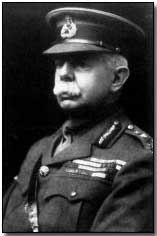 Just
where it I was I could not make out; it did not seem to be under direct
observation.
Just
where it I was I could not make out; it did not seem to be under direct
observation.
A high and considerable breastwork of sandbags zigzagged away to the right (this had been the method of disposing of the earth brought out of the workings), and the ground beyond, which rose quickly to a low ridge not far away, was absolutely desolate.
We moved around a corner in the breastwork and formed a continuous chain to transport the bags back into the galleries where they were wanted for tamping - that is, for building a barrier against the backward force of the explosion.
I was the last man in the chain and consequently the farthest from safety, a position for which I had in no wise manoeuvred, and I stood in the comer of a traverse where the breastwork turned sharply to the left and gradually petered out in the waste.
We worked with a will, for our task was light and the fresh air a welcome change from the stuffy atmosphere of the saps. An observation balloon on the far horizon attracted our attention, but whether friend or foe we could not decide.
Shortly after, a battery began to fire and the shells burst on the ridge about a hundred yards away; another salvo passed over and crashed on the hill behind.
"No need to worry"; we thought. "They were not intended for us." We had progressed so well that the N.C.O. thought it would be a good idea to lengthen the chain. Three of us moved round the corner and the work continued.
Suddenly the gun fired again and something in the scream of the first shell foretold that it was for us. I ducked as it burst opposite the corner of the breastwork. We ran like rabbits for the sap. I was turning the last bend when a man a few yards in front crashed to the ground. He was a youngster just out from England who had taken up the position I had recently vacated.
Aided by the man in front I attempted to lift him, but we were now alone, some 50 yards from the entrance, and an approaching salvo urged us forward again. I reached the sap opening, panting and frightened, and hung on to the timber baulk at the side to regain my breath.
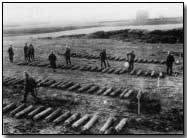 It
was safe there, and we waited while the sergeant went to Headquarters for
instructions.
It
was safe there, and we waited while the sergeant went to Headquarters for
instructions.
At that moment Corporal B. of our company arrived on the scene, and, on learning what had happened, demanded why we had left the casualty out there. We were certain he was dead, but the corporal would not be satisfied.
"Come on, one of you men," he said. "We must fetch him in." No one moved; We had all been thoroughly shaken. I felt ashamed. Why wouldn't someone go? A last appeal and Corporal B. started alone. Something for the moment overcame my terror and impelled me to follow him. We raced along the breastwork.
All was still. We bent to raise the prostrate figure at the corner, but the hand of Death had made the task too much for our strength, weakened by the stress and excitement. Shelling recommenced and the bags above began to scatter around us.
"Run!" screamed the corporal, and with my remaining energies I ran as I had never run before, as a regular tornado of shells smashed down the breastwork behind us. The stretcher bearers who fetched him in later, when all was again quiet, reported that he had pieces of shrapnel through the brain and the heart and therefore must have died instantly. How he had managed to run a dozen yards and turn the corner I could never understand.
The Attack. The afternoon of June 6th found us back at the Bund dug-outs preparing for the advance. It had been rumoured for some days that the long-expected offensive was imminent, but the actual orders came suddenly, as they usually did to the men in the ranks.
The battalion was to attack on the morrow. "B" Company was to be in close support, and this was generally thought preferable to "going over the top"; though memories of a similar position before the Butte de Warlencourt on the Somme, when the supporting company was severely punished, did not reassure me.
The sun shone brightly and the Bund dug-outs had thrown off the lethargic appearance usual at that time of the day. We were not under observation, and could go about our preparations unmolested. All was quiet. In the little stream that trickled down the embankment from the lake we were able to wash ourselves - perhaps for the last time.
Some whose steel helmets lacked the regulation canvas cover were daubing them with mud; officers were trying on their rankers' tunics, which would make them less conspicuous to the enemy; while stretcher bearers, runners, and others were sewing distinctive badges to their sleeves.
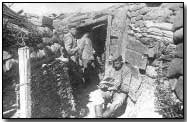 On
the embankment above a notice board, relic of a more leisurely type of
warfare, forbade us to catch fish with Mills' bombs - a sport in which we
were very unlikely to indulge just then.
On
the embankment above a notice board, relic of a more leisurely type of
warfare, forbade us to catch fish with Mills' bombs - a sport in which we
were very unlikely to indulge just then.
Below lay the flats dividing us from Ypres, which filled the middle distance and stood out clearly, a tooth edge of jagged ruins, in the afternoon sun.
Tea was served and those fortunates detailed to go back to the transport field as reinforcements were preparing to leave. Those last bright hours passed slowly. When at last night began to fall tractors hauling heavy guns crawled out from Ypres and took up positions on the flats in front.
At certain points guns were placed wheel to wheel and no attempt was made to hide them. Gun after gun left the town, and now with the thickening dusk there followed streams of men: small groups at first, followed later by long files reaching out like tentacles into the Salient.
Lastly, throwing caution to the winds, the field guns galloped up the roads, followed closely by their ammunition trains. Surely never through all its vicissitudes had the Salient witnessed such a furious activity.
At midnight the company moved off and followed the duckboard track towards Hill 60 once again. Lying by the route at the corner of the Bund, I saw two shapes, roughly covered by a piece of old sacking. The blackness of their exposed features told me that they had long lain thus: in the bustle of preparing for a push the small services due to the dead were often overlooked.
I felt sad; there was no peace here even in death. Suddenly the raucous blast of a Strombus horn came from near at hand, and the terrifying cry of "Gas!" passed down the file. The enemy were "strafing" with gas shells, which whined over and struck the ground with their peculiar undecided thud, while a sickly smell came to my nostrils.
The fear of gas was the greatest fear of all, and we sighed with relief when we had passed through the danger zone, and could take off our box respirators. The remainder of the journey to the jumping-off trench was accomplished without mishap.
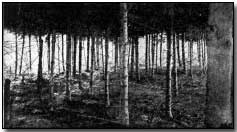 The
trench was newly dug somewhere on the hill and nowhere more than 4.5 feet
deep. We looked like getting a thrashing when the show commenced.
The
trench was newly dug somewhere on the hill and nowhere more than 4.5 feet
deep. We looked like getting a thrashing when the show commenced.
The attack was to be preceded by the explosion of the mine. There in the bowels of the earth after many months of preparation, tunnelling, and counter-tunnelling by the enemy, an unprecedented amount of explosive had been buried and the effects of the detonation of such an immense charge were uncertain.
We might all be involved. In any case our trenches might close in, and, to evade that possibility, we were ordered to lay out on top for the event.
The night was clear; the guns were silent. Ever and anon an enemy Verey light went up from his line and spread a lurid glare over the scene. Those hours of waiting were hardly bearable. At last the first streaks of dawn showed in the sky, and whispered orders sent us to our positions a few yards in front of the trench.
The last few minutes dragged with relentless slowness; each second seemed an hour, each minute an eternity. The greyness of a new day now suffused the sky. I felt a tremor of fear run through my body; the silence of the grave seemed to enfold the whole world.
With a sharp report an enemy rocket began to mount towards the heavens. A voice behind cried "Now!" It was the hour, and that last enemy light never burst upon the day. The ground began to rock and I felt my body carried up and down as by the waves of the sea.
In front the earth opened and a large black mass was carried to the sky on pillars of fire, and there seemed to remain suspended for some seconds while the awful red glare lit up the surrounding desolation. No sound came. I had been expecting a noise from the mine so tremendous as to be unbearable.
For a brief space all was silent, as though we had been too close to hear and the sound had leapt over us like some immense wave. A line of men rose from the ground a few yards in front and advanced towards the upheaval, their helmets silhouetted and bayonets glinting in the redness of that unearthly dawn. I saw no more.
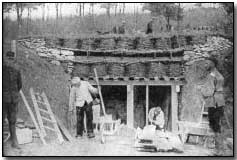 We
hurled ourselves back to the trench. And then there was a tremendous
roar and a tearing across the skies above us, as the barrage commenced with
unerring accuracy.
We
hurled ourselves back to the trench. And then there was a tremendous
roar and a tearing across the skies above us, as the barrage commenced with
unerring accuracy.
It was as though a door had been suddenly flung open. The skies behind our lines were lit by the flashes of many thousand guns, and above the booming din of the artillery came the rasping rattle of the Vickers guns pouring a continuous stream of lead over into the enemy's lines.
Never before, surely, had there been such a bombardment, and I shuddered for those unfortunates caught in that storm of death. Yet the German gunners were not slow to answer their S.O.S. call, for before I had crossed the few yards back to the trench their shells were already bursting around. I saw the trench before me and in my excitement I slipped upon the edge and fell head foremost amidst a rain of loose earth.
My helmet slipped off and I was just able to drag out my Lewis gun buckets before a stream of humanity striving to reach the deeper parts of the trench carried me before it.
I had lost my steel helmet and could think of little else during the whole bombardment. The shells lashed the ground with fury. Each piece of flying shrapnel seemed to be searching for my unprotected head and as I pushed it into the parapet the loose grains of earth matted my hair and trickled into the collar of my tunic. The rest of the section crouched near.
Our corporal, Regular soldier and veteran of the First Battle of Ypres, sat crouched in the corner, his knees almost to his chin, and, except for an occasional blasphemy or laconic "The next one'll get us," he remained motionless. My pal leaned against the parapet, his eyes closed as though death had already come to him, and a little further along another youngster cried audibly.
From right and left came cries of pain and the stretcher bearers, risking all in their devotion, pushed backwards and forwards to dress the wounded.
Our casualties were heavy, but fortunately the enemy batteries were disorganized and the shooting somewhat haphazard, otherwise few of us would have escaped that morning. News came back of the success of the first advance with comparatively light casualties, and, after a lull, our guns increased again to tremendous fury while the attack was further developed.
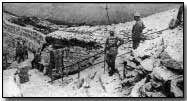 The
crack of rifles and rattle of machine guns came through the din.
The
crack of rifles and rattle of machine guns came through the din.
Casualties this time were much heavier, as was to be expected. Then the bombardment slowly died away and it was obvious that the time for consolidation had arrived. Orders came for us to lead along the trench, and I soon found a helmet for which the owner no longer had any use. I appropriated it thankfully.
We got mixed up with a carrying party coming from the opposite direction, and the enemy, who could see into the lower parts of the trench, began sniping with "whizz-bangs." Those small, swiftly travelling shells came without warning and spread a greater feeling of "wind-up" than did the larger varieties.
Something had gone wrong and we were turned about. A shell hit the parapet near by and a second burst on the inside of the parados, but 2 or 3 yards away. The man in front was killed, while I, who was lifted from my feet by the explosion and enveloped in a thick suffocating cloud of yellow fumes, remained unscratched. Such were the fortunes of war.
For the next hour or so I was suffering from shell-shock and only half-conscious of the withering fire that the enemy directed against us from the left sector of the old line behind us. The shelling was measured and nerve-racking. Each shell was intended for the trench and did not fall far away.
The casualty list lengthened, and it seemed that endurance could stand little more. Our inactivity was deadly. At last the enemy got tired, and towards the late afternoon all became quiet.
Then came the order for us to reinforce the troops in Battle Wood. We left the trench and crossed the shell-torn hill by the railway cutting.
The crater, which I expected to see as an immense jagged hole in the ground, was actually a large flat-bottomed depression like a frying-pan, clear and clean from debris except at the further edge, where vestiges of one of the enemy's trenches showed through its side. The poor devils caught in that terrible cataclysm had no chance. Yet what chance was there for anyone in that war of guns and mathematics?
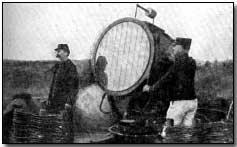 On
the nearer lip of the crater lay the body of a German still clutching his
rifle. He was a tremendous fellow well over 6 feet in height, I should
think, and seems to have made a single-handed effort to hold up the
advancing British line. How he got there is difficult to imagine.
He was probably out on advance post between the mine and our lines and had
retreated to the crater to make his last brave stand. A murmur of
admiration passed down the file at the recognition of such courage.
On
the nearer lip of the crater lay the body of a German still clutching his
rifle. He was a tremendous fellow well over 6 feet in height, I should
think, and seems to have made a single-handed effort to hold up the
advancing British line. How he got there is difficult to imagine.
He was probably out on advance post between the mine and our lines and had
retreated to the crater to make his last brave stand. A murmur of
admiration passed down the file at the recognition of such courage.
Here and there black fountains of earth were thrown up as heavy enemy shells burst in the wilderness and put a finishing touch to that scene of desolation. I could survey the whole of the famous hill and, away in front, the tree stumps of Battle Wood; and it occurred to me that until that day no man had, during those many months since the first battles, stood on that same ground in daylight and lived.
Private E. N. Gladden, at the end of 1915, when eighteen years of age, attested under the Derby Scheme. Called up in the following May. Passed for home service and posted to the 2nd/1st Hertfordshires. Left England on August 30th, 1916, and joined the 7th Battalion Northumberland Fusiliers on the Somme.
Badly handled both by the enemy and the weather in the October-November battles about Le Sars and Warlencourt. Contracted trench feet and crossed to Blighty in the ill-fated "Glenart Castle" at the end of December.
Early March back at the Depot at Catterick and to France May 2nd, 1917, and posted to the 11th Battalion in the Salient. Then followed Messines, the Third Battle, and Passchendaele. Italy (23rd Division) in November. Xmas in the trenches on the Piave-Montello front.
Transferred to the mountains in March 1918. The battalion took a leading part in both the Austrian offensive on the Asiago Plateau on June 15th, and the final crossing of the Piave on October 27th, 1918.
First published in Everyman at War (1930), edited by C. B. Purdom.
Photographs courtesy of Photos of the Great War website.
Prevalent dysentery among Allied soldiers in Gallipoli came to be referred to as "the Gallipoli gallop".
- Did you know?
